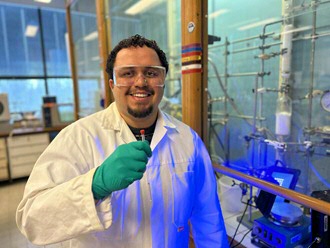Advent calendar - December 16th - Luan Moreira Grilo
In the Zernike Institute Advent Calendar, we are presenting 24 short spotlights in December. In these specials, we highlight PhD students, postdocs, support staff and technicians of our research groups and team - providing a glimpse in their typical day at work. In Episode 16 meet Luan Moreira Grilo, double degree PhD student in the Macromolecular Chemistry and new Polymeric Materials group of Prof. Katja Loos & Dr. Dina Maniar.

Currently, I'm a double degree PhD candidate at the University of Groningen in the group of Macromolecular Chemistry and New Polymeric Materials here in the Netherlands and at the Industrial Biotechnology Postgraduate Program of the University of Sao Paulo (USP) in Brazil. This opportunity to work in two universities on different continents has been paramount in broadening my scientific perspective and for my personal growth. It also allowed me to work with talented scientists from all over the world, who are striving to make a difference too.
As it is known, the overdependence on fossil resources and the accumulation of plastic waste in the environment are great challenges that our society faces as it transitions to more sustainable practices. In this context, my work is just a drop in the sea of scientific development that may push us towards a greener future.
Overall, my project focuses on developing novel polymeric materials from biobased sources. For such, I mainly work with an emergent class of furanic cyclobutanes synthesized from renewable sources via UV photochemistry. From these monomers, my research is split into two approaches. One strategy focuses on the more conventional polymer synthesis, such as polyesters and polyamides, using the aforementioned furanic cyclobutanes. The other approach seeks to exploit the dienic properties of the furan ring in the formation of dynamic bonded polymers by using the Diels-Alder reaction as the method of polymerization. Hence, the polymers obtained through this method are expected to have self-healing and ease of recycling properties.
My day-to-day involves a lot of lab work, like testing new synthetic methods, optimizing reaction conditions, cleaning up glassware, and carrying out analyses such as NMR, FTIR, DSC, etc. But it also involves a lot of reading, analyzing data, and writing. Additionally, this year, I began supervising master's students, and it turned out to be a fantastic experience. These opportunities allowed me not only to share my knowledge but also to learn a lot alongside my students.
More news
-
15 September 2025
Successful visit to the UG by Rector of Institut Teknologi Bandung
